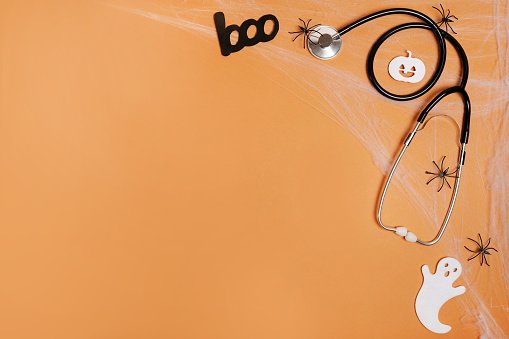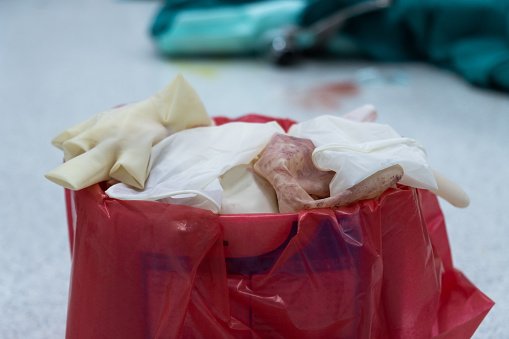Nightmare Nursing: 1 hellish tale from the dark(bed)side
*Identifying details have been changed to protect privacy.
I couldn't have been a nurse for more than a handful of months. Long enough to have graduated from preceptorship, long enough to have begun feeling comfortable with my bedside skills. But, not long enough.
You know when most accidents happen—that precipitous intersection between being skilled at something but yet lacking the experience to be completely safe. In other words, confident enough to hurt yourself. This was the headspace I was in, when I had the worst moment of my professional career to date.
At that time I worked on what was known as the “stroke floor.” Our patients were mostly nursing home transfers with TIAs, maybe an occasional step down from the neuro-ICU. Many, if not most, were complete care patients, bed bound and living existences you can only assume are miserable. One such patient I picked up that shift was new to me, but well-known to my unit.
Mr. X had a sad history. Jumping into a pool 20 years ago had resulted in a fractured c-spine and a major intracranial hemorrhage. This, at the tender age of 25. His injury obliterated his ability to walk, talk, and move his body from the chest down, Mr. X had the further misfortune of delayed rehabilitative care.
Trached and sometimes vented for respite, and only able to move his left shoulder, Mr.X was constantly in and out of the hospital with flare-ups due to his longterm-care needs. A quiet guy, he didn’t ask for much. Which is to say, his wife didn’t. Despite all this, he was married at the time of the accident, and his wife never left his side even after all those years.
During report for the day, the outgoing night shift nurse informed me that Mr.X needed a new urostomy placed. This was to be done at the bedside by the urologist at some point that day.
His am labs had just come back, however, revealing his INR to be 4.1—too high for an invasive procedure. Informing the urologist of this was passed on to me. I placed a call to his service and started my rounds.
Three calls later (and still no return call) had me assuming that the procedure was canceled. To my surprise the urologist strode onto the floor while I was at lunch, and I returned to my shift to find my charge nurse annoyedly setting up a procedure cart outside his room.
“You really should have had this set up before going to lunch!” she hissed under her breath to me, one eye on the doctor impatiently tapping his foot behind us.
“But, wait! Umm—I don’t think he’s having this done, “ I interjected. “His INR is way too high—I’ve been waiting on a call back from his office about this!”
“Ughh,” she groaned. “Dr. (Urologist) doesn’t use his on-call service. You have to page him directly. I’m surprised the night shift didn’t tell you that since you’re new.”
Sheepishly, I approached Dr. Urology. “Umm? “ I began timidly, “I’m sure you saw, but Mr. X’s INR came back pretty high? 4.1?
So, I called your office, umm, I didn’t know about your pager, I’m sorry, but, umm, I assume you saw his labs in the computer and got the message I left? Sorry you had to walk all the way up here. Umm….”
A large man, he towered over me and waited a beat before speaking. “Vee are steel going to do eeet,” he said with a flat, vaguely eastern european monotone.
“Gadder my tings. I vill be back in 10 minutes. ” And with that, he turned abruptly and disappeared into the doctor’s lounge.
Oh, no.
The unit was starting to get busy. Visiting hours had just started, patients were returning from their morning therapies, procedures, and diagnostic imaging scans, and food service was collecting trays. I scanned the unit for the charge nurse, unsure of how to proceed.
I mean, the doctor was wrong. I just had no earthly idea about where to go from here.
A few minutes later, I found her and explained that he still wanted to proceed despite being very much aware of Mr. X’s hypocoagulable state. She rolled her eyes and then, to my horror, said, “Well, I guess you better prep then.”
Now, let me be clear. This is absolutely the part of the story where I should have listened to my gut and the very LOUD message it was sending me, which was basically “NO, NO, NO, this is WRONG. Advocate for your patient!”
I wish I had listened to that voice. That’s maybe what makes what happened next particularly terrible—I knew it was wrong, but I participated anyway.
The thing is, when you’re a novice, you assume that others know more than you. You assume that, because it’s almost always true. Combine that with my people-pleasing ways, my fear of appearing as the annoying—but, that’s not what I learned in nursing school!—newbie, all percolating in a culture of Nurses Eating Their Young (especially the annoying young), and what happened next feels less…surprising.
The procedure did not go well.
Not only did Dr. U under-anesthetize poor Mr. X, but he was unable to place the urostomy on the first try. Nor on the second, or third. Finally on the 6th attempt, a spray of maroon-colored urine shot into the air, and directly into my eyes.
Of course, I was not wearing eye protection, having gathered all my supplies in haste. I scrambled into the patient bathroom to splash water on my face and rinse off the urine. When I turned around, I found that Dr. U, his job “complete,” had left the room, leaving me to secure the tubing, and clean up. I stole a look at his wife, and our horrified expressions mirrored one another.
Within moments I knew this patient needed major assistance. With nary a clotting factor available, Mr. X began to bleed. Or, wouldn’t stop bleeding, to be completely accurate. I left his side to quickly step into the door frame and wave my arms, SOS-style, until I caught the attention of the charge nurse. Upon hearing my quick account of what had gone down, especially the part about my blood-borne exposure, she quickly flagged down a PCT to help her with Mr. X and pushed me off the unit towards employee health, the words “incident report” following me down the hall.
I had just barely begun to fill out the paperwork when I heard a code called for Mr. X’s room. Despite a valiant effort, and multiple rounds of vitamin K, he didn’t make it.
He died.
My patient died after a procedure was performed on him that I knew shouldn't have been performed on him. My patient died and I felt like I might die, too.
Any seasoned nurse can rattle off the med errors they’ve had, or perhaps a time or two a patient fell unexpectedly on their watch. Lots of paperwork, but little lasting damage done. I, on the other hand, eventually sought the help of a therapist to deal with the aftermath of this incident. I had so much shame, guilt, and remorse. I didn’t know how to cope knowing I could have made more of an objection; that maybe, Mr. X—who already had such a shit hand dealt to him in life—could have been spared such a traumatic end.
What I know now, is that most errors of this caliber happen because of a swiss cheese effect. Each misstep on its own may not have resulted in such an unfortunate outcome, but layered upon one another, a gaping hole was left. In this case, my inexperience, the doctor’s negligence, the charge nurses’ apathy, and even his wife’s silence all factored in.
Nursing students get little to no information about how to handle situations like this. Unless they come up during your preceptorship, a mentor may not mention how to stand up to those “above you.” Our hospital had no sort of GN-support system, nor did I know any other GNs on my unit I could have run it by. Since it happened more than a decade ago, there wasn’t even a virtual community—like NurseDeck—I could have relied on for support.
I felt alone, unsure, and pressured. I doubted my voice. So I stayed quiet.
It’s hard to share this story. But, I know that perhaps if I had read an account like this one when I was starting out, I would have been better prepared to gather my strength and listen to my gut. It’s never failed me since, and I hope yours never does either. Otherwise, you may find yourself in the midst of your own nursing nightmare.




